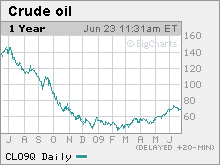Oil falls below $69 on Fed statement
Earlier report shows gasoline supply jumped, placing downward pressure on crude prices.
Find Your Next Car
NEW YORK (Reuters) -- Oil prices fell Wednesday after the Federal Reserve held interest rates near zero and said the nation's pace of economic contraction is slowing, but that the economy will stay weak for coming future.
The Fed concluded its two-day policy-setting meeting Wednesday. Investors look to the statement to gauge the U.S. economic outlook.
Oil fell 57 cents, or less than 1%, to settle at $68.67 a barrel Wednesday.
Crude was earlier supported by news of a bigger-than-expected draw in U.S. crude oil stocks and growing geopolitical troubles in some OPEC member countries.
U.S. gasoline stocks rose by 3.9 million barrels in the week to June 19, well above analysts' forecasts, as refiners cranked up output in the midst of the summer driving season.
Distillate stocks hit 10-year highs, while crude stocks showed a steep drop.
"Crude futures are back down on the weight of a stronger dollar," said Mark Waggoner, Excel Futures President from Huntington Beach, Calif. "The EIA inventory report also showed large increases in gasoline and distillate stocks and that's dragging down crude."
The U.S. dollar rose broadly and jumped against the Swiss franc as traders reported the Swiss National Bank was intervening in the market by selling the currency for dollars and euros. The rising dollar can pressure commodities denominated in the greenback.
Optimism over a potential economic recovery boosting flagging fuel demand has lifted oil prices from below $40 a barrel.
However, crude imports by No. 3 consumer Japan fell by 18.8% in May against last year, according to government data. EIA data showed total U.S. demand down 6.6% in the four weeks to June 19, compared with year-ago levels.
Multiple militant attacks on pipelines and oil installations in OPEC member Nigeria recently have forced production stoppages at sites run by Agip, Chevron and Royal Dutch Shell, stoking supply concerns.
A senior official said Nigeria's president will propose a 60-day amnesty program for militants in the Niger Delta on Thursday, in an effort to end years of attacks on Africa's biggest oil and gas industry.
Traders were also keeping an eye on the worst civil unrest in 30 years in Iran, the world's fifth-largest oil exporter, over a disputed presidential election.
Iran's Supreme Leader Ayatollah Ali Khamenei declared Wednesday that a disputed election result would stand. ![]()


